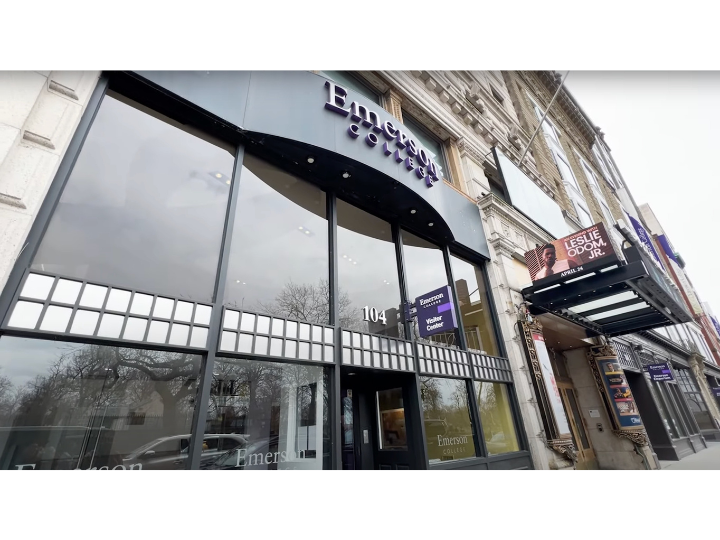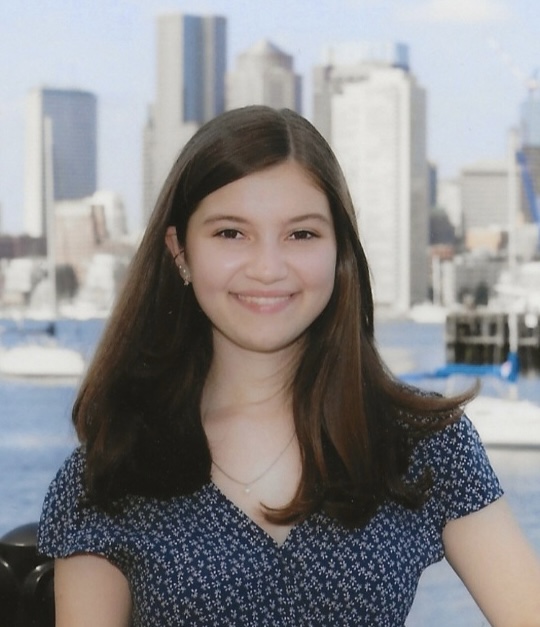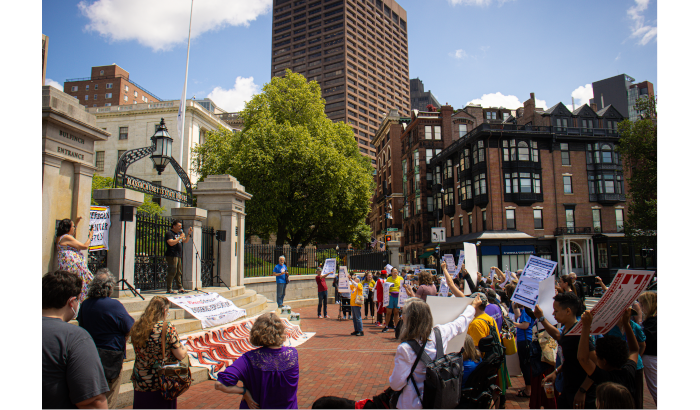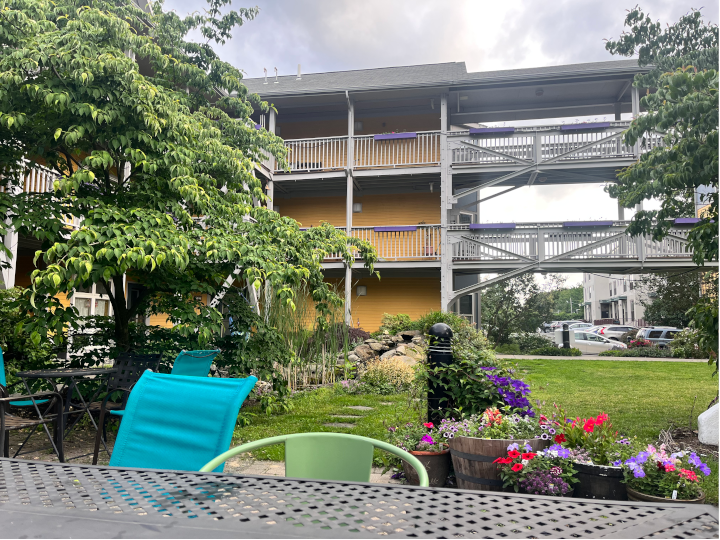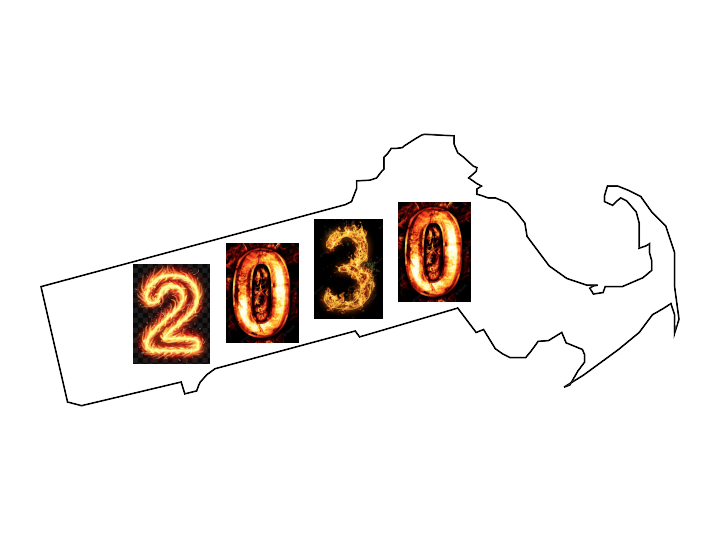The Emerson College administration put rules in place in response to last year’s campus unrest that some community members say violate their First Amendment rights
BOSTON – Last April, 118 people, including students and non-Emerson protestors, were arrested in the Boylston Place Alley—a cul de sac flanked by Emerson College buildings and the State Transportation Building—for blocking a public right of way and disturbing the peace while protesting Emerson’s stance on the Israel-Hamas war in Gaza and related conflicts.
Since the alley is public property, the Boston Police Department made the arrests, rather than the Emerson College Police Department, because the encampment violated a city ordinance that prohibits unlawful camping on public property in a public right of way.
Emerson Students for Justice in Palestine and the Emerson Student Union hoped setting up a camp in the alley would pressure the Emerson administration to meet their seven proposals, which included budget transparency, creating fellowship positions for Palestinians, and calling for an “immediate and permanent ceasefire in Gaza” on the college’s public platforms.
Following the arrests, the administration implemented new conduct policies prohibiting protesting in the Boylston Place Alley and taking a stance on geopolitical situations.
“We heard the community’s desire for more clarity and transparency around policies and processes that lay out responsibility and accountability for actions on campus,” Emerson President Jay M. Bernhardt wrote in an Aug. 23, 2024 email announcing the new policies.
The Emerson administration implemented these policies that “infringe” on student’s civil liberties “without explanation or transparency,” said Hallie Munsat, a second-year interdisciplinary studies student who is Jewish. Munsat said the war between Israel and Hamas “is unnecessary.”
The updated conduct policies banned use of the Boylston Place Alley for any college events.
Now, as Emerson students return to class for the spring semester, a Gaza ceasefire has been brokered between Israel and Hamas. While a harrowing and bloody period of that conflict may be coming to an end after more than 14 months, the new policies born from protests on this campus, like others all around the country, will remain in place.
Following arrests, new coalition publishes newsletter
In a public statement made last April, Emerson President Bernhardt wrote, “Because we are committed to our students’ right to protest, Emerson made every possible effort to avoid confrontation between the police and the protesters at the encampment.”
Days earlier, protesters had been charged with violations including unlawful assembly and disturbing the peace. According to the Berkeley Beacon, many of those arrested were offered a plea deal of “40 hours of community service at a nonprofit of the student’s choice in exchange for case dismissal and the removal of charges from their criminal record.”
In his statement, Bernhardt added that the college would not “bring any campus disciplinary charges against the protestors and will encourage the district attorney not to pursue charges related to encampment violations.”
However, members of the Emerson community face disciplinary actions for other expressions of their First Amendment rights, according to Discipline News, a newsletter published by a mix of students, staff, and employees from several unions and organizations, including Faculty and Staff for Justice in Palestine. In a joint statement, Instruction Technologist Illona Yosefov and Visual Media Arts Professor John Gianvito explained that the publication seeks to keep the Emerson community “informed about ongoing efforts by individuals within Emerson’s administration to punish students, staff, and faculty exercising their right to free speech.”
Arguing that the administration has “overreached” with its new policies, the Emerson Staff Union-SEIU Local 888 is “drafting a policy to protect the rights of Emerson community members from direct action.” Yosefov, who is the chief steward of the labor organization, said they are using the staff union contract as a model. Currently, any student, staff, or faculty member who violates the conduct policies is subject to disciplinary action. In September, Yosefov was disciplined for leafleting on the street outside the building where a faculty meeting was happening.
“Discipline is serious,” she said. The measures taken against her based on the new policies, Yosefov added, could “potentially impact my livelihood.”
Students arrested outside of “Golda’s Balcony”
According to Discipline News, Emerson placed four students on probation for distributing a leaflet on the sidewalk outside of the Paramount Center on March 7, 2024. The leaflet addressed the history of former Israeli Prime Minister Golda Meir, the subject of the play “Golda’s Balcony” running at the venue last winter.
Weeks later, on March 22, 12 Emerson students and one non-Emerson student were arrested by Emerson College Police while protesting outside of the inauguration of President Bernhardt. The group protested tuition increases, suppression of students and faculty, and the failure of the school to acknowledge the genocide in Gaza.
The students were charged with disturbing the peace and disorderly conduct. Emerson did not pursue disciplinary action against the students and encouraged the Suffolk County district attorney to dismiss the charges, Berhnardt wrote in a March 24, 2024 statement.
Interdisciplinary Studies Professor Nigel Gibson considers disciplinary action, for students in particular, to be “such a time suck from what they’re actually here to do.”
Discipline News published two issues in December. Yosefov and Gianvito wrote, “Sadly, we already have more and more news to report and plan to continue letting all those interested in knowing what is happening out of view on as regular a basis as is possible.” They said regular publication of the leaflet will resume when students return for the spring semester.
Emerson alumni rally in support of student protesters
Due to these disciplinary actions and the handling of the encampment, last year the group Emerson Alumni For Justice in Palestine started a boycott of speaking at classes, joining alumni panels, and meeting with students on campus.
One of the boycotters, Sarah Edrie, graduated from Emerson in 1995 and made an annual donation to the college until this year. Edrie previously spoke on panels and produced shows with students.
The strickening of civil liberties on campus “is a deliberate move towards a more controlled and less tolerant approach to student activism and free speech,” Edrie said. “EAJP has successfully mobilized … hundreds of alumni, with 127 individuals formally signing the pledge to withhold donations and participation in college events.”
EAJP also facilitated sending more than 1,000 letters to college officials, which the Emerson administration has acknowledged receiving, but has not formally responded to, according to Edrie.
With protesting no longer allowed in the alleyway, dormitory lobbies and classroom buildings are the new spaces where protests can occur, but all protests must be pre registered and approved by the college. As a private institution, Emerson reserves the right to limit the First Amendment protections of students, staff, and faculty.
Merritt Hughes, a second-year journalism student at Emerson, said the need to register a protest is “silly,” “because a protest is a resistance or disruption,” whereas registering one “makes it a club meeting.”
Debate over physical and safe spaces on campus
Arthur Mansavage is an Emerson student and the social media manager of Emerson Hillel. Speaking to HorizonMass for this article, he said, “I’m not saying I necessarily agree with all of their protest policies, but I do think that limiting the physical spaces on campus where demonstrations are allowed was needed after last semester.”
Last April, Emerson students formed a new pro-Palestinian group, Jews Against Zionism.
Fourth-year student and Emerson Hillel President Ari Willis published an opinion article for the Beacon about the formation of JAZ. He wrote, “By calling for the removal of Hillel, these so-called ‘self-loving Jews’ are calling for the removal of safe spaces for the Jewish students who need it most.”
Willis added that the group’s calls for the removal of Hillel “weighed heavily on all of our community members,” as many students had found “comfort in Hillel during these horrific times.”
Hallie Munsat stopped attending Hillel meetings due to what she described as a “hostile environment,” where members speak negatively about other students while “completely ignoring social and political contexts.”
She said the Emerson “administration has proven to be on Hillel’s side.” But despite having left the group, Munsat told HorizonMass that she “believes it is important for Emerson College to have a Hillel chapter on campus.”
Long running film program cancelled after screening of “Israelism”
Hillel International, for its part, has faced criticism around the US—from pro-Palestinian activists from a broad array of backgrounds including Jewish, and from Jewish activists whose politics are pro-Israel but who also seek peace with the Palestinians. Notably in the film “Israelism,” a 2023 documentary directed by two American Jews who, as part of their larger critique of major Jewish institutions in the US, attempt to demonstrate that the organization is effectively operating as a campus propaganda and recruitment wing of the Israeli government.
Emerson postponed a campus screening of “Israelism” originally set for Nov. 9, 2023, just over a month after the Oct. 7 attacks, to Feb. 1, 2024.
Prior to the screening, the college released a statement that the showing was to promote dialogue and that “screening of films in [the Bright Lights Cinema] Series does not connote endorsement or support of the film’s content by Emerson College or the Visual and Media Arts Department.”
The Feb. 1 screening filled all 174 theater seats and 50 or 60 people watched on their own, according to series founder and then-curator Anna Feder. Feder received more than 1,000 non-Emerson emails urging her to cancel the screening and said upper administration had ‘vague’ security concerns.
After a 12-year run, Emerson canceled the Bright Lights series and eliminated Feder’s position in August. The administration cited budget cuts as the reason for its cancellation and the layoff of 10 staff members, Feder’s being the only union position. The series showed 24 films each school year and hosted conversations with filmmakers, costing $25,000 annually to run plus Feder’s salary.
Following the cancellation, faculty organized a campaign encouraging the college to bring the series back. The faculty group created an Instagram account and received 3,000 signatures to its petition.
Sarah Edrie said, “The cancellation of the Bright Lights Film Series, a program that fostered community engagement and provided invaluable opportunities for students to connect with industry professionals, was particularly disheartening.”
Past campus protests, administration responses, and EmersonTogether
This is not the first recent period of protests on the Emerson campus; in 2017, hundreds of students protested the administration for racism and bias. Students again demanded more equity and accountability from the college in November 2020 following the second wave of Black Lives Matter protests that summer.
The campaign was called the Emerson Students of Color Week of Action, and students demanded that administration publicly apologize for how incidents of bias and racial equity were handled on campus. At points, students interrupted faculty meetings and chanted loudly through hallways to petition their demands.
“Oftentimes, if they are too quiet, if they’re not disruptive, they’re going to be ignored,” said Yasser Munif, a professor of sociology since 2011. “They have a tendency to be disruptive and loud and visible. As a result, the college formed a number of committees and asked students to sit on a number of committees.”
According to Munif, the 2020 protests led to improvements in the college under the Lee Pelton administration. That included: the Emerson Circle of Creative Scholars scholarship program for historically marginalized students, increased need-based financial aid, and the Deans’ Fellowships for Racial Equity.
The new protest policy seems “contradictory to what Emerson stands for,” specifically pertaining to the college motto “Expression necessary to evolution,” said Nigel Gibson. The professor began working at Emerson 24 years ago and considers this time at Emerson “quite different from any other period” he’s experienced at the college.
In his administration’s efforts to respond to student unrest, Bernhardt’s email also announced the creation of an EmersonTogether initiative that will, according to the college, “strengthen the shared values of our community, build bridges of understanding, and engage in healing.” So far, EmersonTogether has included town hall conversations, guest speakers, and a post-election panel that align with those goals.
At the end of November, Emerson hosted two discussions on the Israel-Palestine conflict led by scholar Peter Krause, an associate professor of political science at Boston College and a research affiliate with the MIT Security Studies program. The first discussion detailed having “constructive conversations on the history” of both places and the second was about how language influences how Israelis and Palestinians experience the conflict.
Emerson’s interim Vice President of Campus Life and interim Dean of Students Christie Anglade said, “Students are integral to the initiative, from participation to proposing events and other ways to bring the community together.”
The EmersonTogether website doesn’t cite any specific student involvement, but Anglade noted, “One of the initial events, the ‘Can We Talk’ series with Penn Badgely and Dr. Nura Mowzoon, was recommended by our orientation coordinator team”—which is a team of students from the Department of Student Transitions.
Anglade said, “My role, and the role of all administration, is to help create an environment at the college where students, faculty, and staff can feel engaged, valued, and supported.” However, those efforts didn’t seem to satisfy anyone’s expectations.
Mansavage, the social media manager for Emerson Hillel, said the EmersonTogether events he attended “have been majority faculty and staff, which [he] thinks further proves that the pro-Palestinian movement doesn’t care to have productive discussions with those who disagree, they only care to make noise for the purpose of making noise.”
Emerson Students for Justice in Palestine told HorizonMass in a statement, “We are not encouraging people to get involved with EmersonTogether. It is clearly a hollow PR campaign implemented here as a scramble for the scrutiny the school and the president received last year.”
Emerson trustees adopt “neutrality” and “mutual respect” policy
On Aug. 8, 2024, the Emerson College Board of Trustees announced it “unanimously adopted the following policy on Institutional Neutrality and Mutual Respect.” The policy states that Emerson “will not take official positions or issue statements on complex geopolitical issues, nor will it consider political pressure in allocating resources, including its endowment investments, or when selecting strategic partners.”
The Board of Trustees consists of 25 members, including President Bernhardt, which oversees on-campus policies and the college’s investments. Most trustees made “Luminary” or “Innovator” donations to Emerson College between July 2023 and June 2024, meaning their donations ranged from $25,000 to $99,999, and $10,000 to $24,999, respectively.
“I am opposed to the declaration that henceforth Emerson will be ‘institutionally neutral,’” Professor John Gianvito said. “Not taking a position is in itself taking a political position. Beyond this contradiction in terms, I find it dispiriting to hear that Emerson is apparently now unwilling to ever publicly take principled stands upon important issues of the day.”
The policy also states, “While performing official duties, Emerson employees may not engage in actions or speech that suppress the expression of diverse viewpoints or suggest they are speaking for the institution.”
Tenured professors are able to teach freely for the most part, however non-tenured professors, particularly those who are part-time adjunct faculty, are not granted the same protections. Nigel Gibson said they’re left wondering, Am I allowed to teach this?
“By maintaining institutional neutrality and mutual respect, Emerson College will remain an open, supportive, and inclusive space for community members of all racial and ethnic backgrounds, sexual orientations, gender identities, religions, national origins, abilities, socioeconomic backgrounds, and beliefs,” the policy states.
Under the new policy, college organizations are not allowed to take political positions. As a result, the student-run Beacon could not endorse a presidential candidate in the 2024 election.
“There is nothing neutral about staying silent,” said Merritt Hughes, who is also the Beacon opinion section co-editor. “The biggest power of a journalist is your platform and we’ve spent the last year increasing our platform.”
Mansavage, who is the Beacon’s photo editor in addition to his social media work with campus Hillel, said, “As a journalist and someone who works at the Berkeley Beacon, these new policies do not in any way limit what I or our staff is allowed to publish.”
Last September, Hughes published an opinion piece in the Beacon about her mixed emotions regarding Emerson after witnessing and reporting on the encampment and subsequent arrests. She said her feelings are “more affirmed” now than when she returned to campus last fall.
In its statement to HorizonMass, Emerson Students for Justice in Palestine indicated that it is “one of many [organizations] collaborating with the Right to Protest Coalition in an attempt to get the repressive post-encampment policies changed.”
Nigel Gibson said the college doesn’t “want people to say anything about Palestine,” or to “talk about antisemitism.”
The situation, he observed, has “fragment[ed] the student body.”
Additional research was provided by Emma Siebold.
This article was produced for HorizonMass, the independent, student-driven, news outlet of the Boston Institute for Nonprofit Journalism, and is syndicated by BINJ’s MassWire news service.

